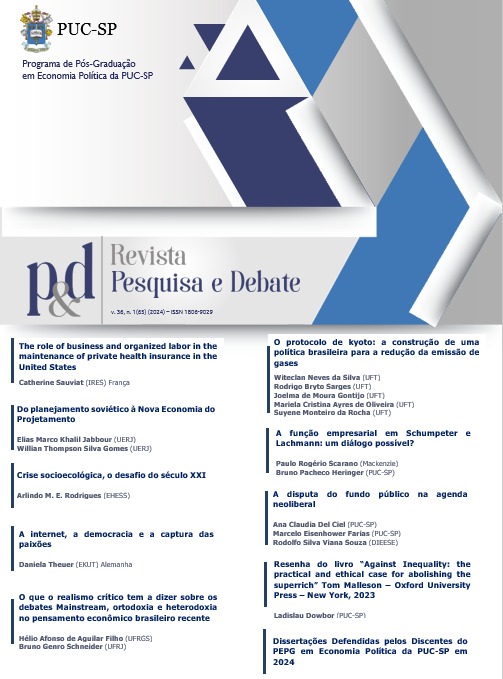The role of business and organized labor in the maintenance of private health insurance in the United States
DOI:
https://doi.org/10.23925/1806-9029.36i1(65)67234Palavras-chave:
cobertura de seguro saúde, planos de seguro saúde, ocupacional, trabalho organizado, negóciosResumo
Business and organized labor in the US have been historically involved in health insurance through employment, in absence of a universal health care system. This employment-based healthcare system remains the dominant form of coverage for Americans today although its importance has been declining over the long-term. Over the last decade and after the passage of the Affordable Care Act, employers and unions have sometimes been challenging the system. But the convergence toward a universal system is likely to be a long process.
Referências
ApRoberts, L. (2000), Les retraites aux États-Unis, Sécurité sociale et fonds de pension, La Dispute, Paris.
Bivens, J. & Zipperer, B. (2020), « Health Insurance and the Covid-19 Shock, EPI Report, August 26. https://www.epi.org/publication/health-insurance-and-the-covid-19-shock/
Bivens, J. (2020), « Fundamental health reform like ‘Medicare for All’ would help the labor market », EPI Report, March 5. https://www.epi.org/publication/medicare-for-all-would-help-the-labor-market/
Brown, L. (1993), « Dogmatic Slumbers: American Business and Health Policy », Journal of Health Policy and Law, vol. 18, n°2, Summer, p. 339-357.
Buchmueller, T. & Monheit, A. (2009), “Employer-Sponsored Health Insurance and the Promise of Health Insurance Reform”, NBER Working Paper Series, n°14839, April.
Case, A. & Deaton, A. (2020), Deaths of Despair and the Future of Capitalism,
Chapin, C. (2015), Ensuring America’s Health – The Public Creation of the Corporate Health Care System, Cambridge University Press.
Coombs, J. (2005), The Rise and Fall of HMOs – An American Healthcare Revolution, The University of Wisconsin Press, Madison.
Derrickson, A. (1994), « Health Security for All ? Social Unionism and Universal Health Insurance, 1935-1958 », The Journal of American History, vol. 80, n°4, March, p. 1333-1356.
Enthoven, A. & Fuchs, V. (2006), “Employment-Based Health Insurance: Past, Present, and Future”, Health Affairs, November/December.
Fox, D. & Schaffer, D. (1989), « Health Policy and ERISA: Interest Groups and Semipreemption », Journal of Health Policy and Law, vol. 14, n°2, Summer, p. 239-260.
Gabel, J., Whitmore, H., Satorius, J., Pickgrein, J. & Stromberg, S. (2015), « Collectively Bargained Health Plans: More Comprehensive, Less Cost Sharing than Employer Plans », Health Affairs, March, 34-3, p. 461-466.
Gottschalk, M. (2000), The Shadow Welfare State, Cornell University Press, Ithaca.
KFF (2023), « Employer Health Benefits, 2023 Annual Survey », Kaiser Family Foundation. https://www.kff.org/health-costs/report/2023-employer-health-benefits-survey/
Lazonick, W. (2009), Sustainable Propserity in the New Economy: Businnes Organization and High-Tech Employment in the United States? W.E. UpJohn Institute for Employment Research, Kalamazoo, Michigan.
Maciejewski, M. & Hung, A. (2020), « High-Deductible Plans and Health Savings Accounts – A Match Made in heaven but Not for this Irrational World », JAMA Network Open, July 17. https://jamanetwork.com/journals/jamanetworkopen/fullarticle/2768344
McDonough, J. (2011), Inside National Health Reform, University of California Press, Berkeley.
Smyrl, M. (2014), « Beyond Interests and Institutions: Us Health Policy Reform and the Surprising Silence of Big Business », Journal of Health Policy and Law, vol. 39, n°1, February, p. 5-34.
Downloads
Publicado
Como Citar
Edição
Seção
Licença
Copyright (c) 2024 Pesquisa & Debate Revista do Programa de Estudos Pós-Graduados em Economia Política

Este trabalho está licenciado sob uma licença Creative Commons Attribution 4.0 International License.


